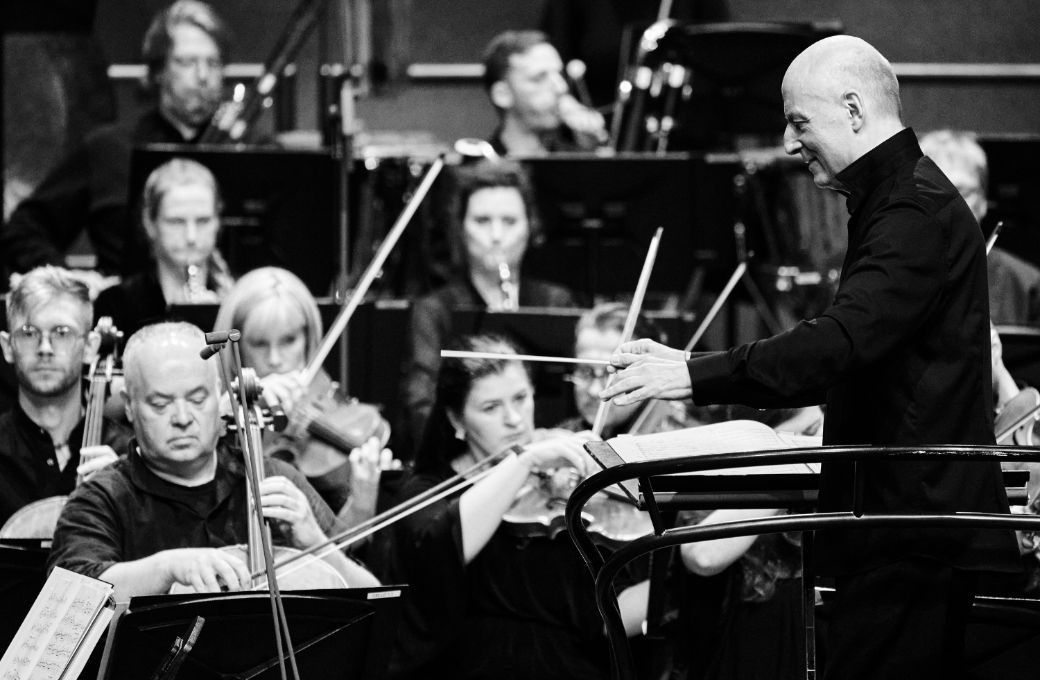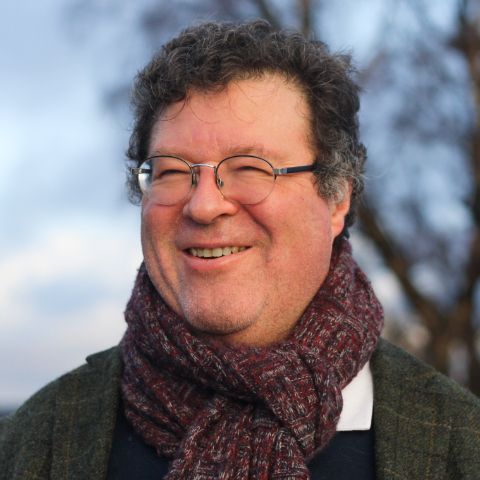In the Zoom age, an interview can take place almost anywhere. Which is just as well, because the Estonian conductor Paavo Järvi is in demand everywhere. Järvi’s career has taken him to positions in Stockholm, Birmingham, Cincinnati, Paris, Frankfurt and Tokyo – and that’s barely the half of it. “I came yesterday from the Orchestra Santa Cecilia in Rome,” he explains. “And now I’m in London for a couple of days before I go back to Zurich.” (Järvi has been chief conductor of Zurich’s Tonhalle Orchestra since 2020.) So who’s he conducting in London? He laughs. “I’m not working with anyone in London! I’m here because I live here.”

Oops. Still, it’s an easy assumption to make with an artist as energetic as Järvi. We’re here to talk about his native Estonia and as we speak, he’s just completed a multi-date European tour with the Estonian Festival Orchestra: the super-orchestra that he founded in 2011 as a means of bringing the brightest young Estonian talent together with the best orchestral players from the wider Baltic region and beyond – any orchestra, in fact (and it’s a formidable list) where Järvi has a working relationship. They assemble each summer at Järvi’s festival in the Estonian seaside resort of Pärnu, and regroup occasionally during the year. He lights up at the mention of their latest adventure:
“One of the good things about this Festival Orchestra is that you have some people who are always the same, and others who change. Some players can do one project and not the other because everybody there is connected to their own orchestras and their own career. And since we have musicians from the top orchestras in the world, they always have to put those as a priority. But all the younger Estonians were there – and I must say, the orchestra was maybe the best we’ve had so far!”
Järvi’s pride is tangible. It’s easy to talk of a globetrotting maestro as an ambassador for their country and culture, and in the Baltic states the Järvi family are like musical royalty. At an EFO concert at last year’s Pärnu Festival the whole audience applauded as Järvi’s father (the conductor Neeme), his brother and fellow-conductor Kristjan and the rest of the extended family took their seats to hear Paavo and his all-stars perform Richard Strauss. Still, it’s Järvi’s international career that has enabled him to make Estonian music more than just a family affair: to open a revolving door to a wider musical world.
“I remember working in the Musikverein in Vienna – we were there with the Orchestre de Paris – and seeing all these posters: Russian National Orchestra, Vienna Philharmonic, and so on. I asked myself ‘Where are the Estonians?’ Then I saw the Budapest Festival Orchestra and Iván Fischer and I said, ‘OK, this is exactly what I'm going to do’. We created an Estonian Festival Orchestra, because with all our singing talent – and there are a lot of very musical people in Estonia – we still don't have one recognisable orchestra that, internationally, is taken seriously in a similar way. That was my mission: I really want the word Estonia to be prominently displayed on those posters! I am an ambassador for my country, and I want to make sure that people associate Estonia with high-level classical music.”
No-one who’s seen Järvi in action in Pärnu would dispute that. Pärnu is a small town; an old-fashioned, slightly sleepy resort with a spectacular golden beach, where boulevards lined with wooden villas criss-cross among the Baltic pines. Once a year, there’s a friendly invasion of musicians and it becomes one of those magical places – like Aldeburgh or Wexford – where you start to recognise performers and fellow-audience members in the streets. A post-concert party last year found Järvi standing outside a café (the sun sets late during the Baltic summer) among a crowd of musicians and fans, sharing a well-earned beer with the President of Estonia. More and more, one senses Pärnu is becoming the creative wellspring around which Järvi’s whole intercontinental career revolves.
“For Estonians, it’s a very special place,” he explains. “It’s what we call the ‘summer capital’ of Estonia and in Soviet times, many great musicians would spend time there: Shostakovich even wrote music in Pärnu. I met both Shostakovich and David Oistrakh at our summer house there. Estonia is already in a special position because we are so close to Russia, and we are also very close to Finland.” That’s true: outsiders don’t always realise that as the crow flies, the Estonian capital of Tallinn is barely 60 miles from Helsinki. “Estonia is in the middle. In my youth, we were the part of the Soviet Union that was closest to the West. We already had a European mindset, so there was a kind of melting-pot”.
Where better to forge a musical future? The Estonian Festival Orchestra is just part of that project. “It’s the perfect place” says Järvi. His own intensely musical youth has given him a special commitment to young musicians, and a large part of Pärnu’s magic comes from that meeting of youth and experience across national boundaries.
“We have this amazing symbiosis where a talented kid from a music high school in Estonia could sit next to the principal viola of the Munich Philharmonic, or have a masterclass from Stefan Dohr [the principal horn of Berlin Philharmonic], or play next to a principal bass from Berlin. They would never normally have the opportunity to meet those people. But if you sit next to a real master, you’re going to grow as a musician and a person. You also create friendships”.
Järvi himself is impassioned about sharing his own expertise and experience – and at this point in his career, he has a lot to give. “All of us discovered classical music because somebody opened the door. Somebody took us by the hand and said, ‘OK, listen to this’, or ‘Come to the concert with me’. In my case, it was my father, but many people don't have parents who are musicians”. Or, indeed, had the chance to meet personal heroes like the pianist Radu Lupu (“His presence was so enormous, and his music-making was so soulful – I learned so much from him”) or the great Estonian composer Arvo Pärt. “Arvo has been a family friend since we were kids. A wonderful human being with great spirit and always a twinkle in his eye. He's not a monk-like figure, like a lot of people think. He’s very alive. He sees everything. He has a wonderful inner world.”
Järvi’s annual summer conducting masterclasses are a central part of his mission in Pärnu. “I'm not so young – I have 40 years of conducting experience. But perhaps people can benefit from that, if they are interested in hearing what I have to say. We have a maximum 16 active participants, and every summer we have over 400 applicants from all over the world – from Italy, Brazil, all over Europe, Russia, China, Korea, you name it. We really take it very seriously, and as a result, we have Pärnu students who are conducting the New York Philharmonic, who are music directors in Finland, and who are guest conducting all over the world.”
As with any great teacher, one gets the impression that the master is learning as much as the students. “That’s one of the biggest kicks,” says Järvi. “There is no standard curriculum, so to speak. Every single person has their own strengths and weaknesses. One person needs to learn how to use their arms, another needs to stop just making beautiful gestures and actually think through what they want to show. And so on, and so on. Figuring out what they need is actually one of the most fun things about teaching. It’s a little bit like being a psychiatrist: lie down here on the couch and tell me what’s the problem. And then you figure out the way to help them”.
And in Pärnu, under that midnight sun, young talents have a way of blossoming. Paavo Järvi has long since won his place at the top table of international conductors, but he knows that roots matter – and each summer, by the Baltic Sea, he makes time to feel the sand between his toes, and pass it on. “For me, one of the most important things in music is not only to play well but to also create a social network that allows you to have musical friends, and be part of a wider community. I enjoy teaching, but it’s also my duty. It’s not just part of being a musician to carry the tradition forward – to give your knowledge to the next generation. It’s part of being a human being.”
The Pärnu Festival runs from 10th–19th July 2024. See all upcoming performances by Paavo Järvi.
This article was sponsored by the Estonian Business and Innovation Agency.


